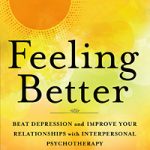
An excerpt from Feeling Better by Cindy Stulberg and Ronald Frey, PhD
I know a successful tennis player who always checks his heart rate before he serves. He knows that if his pulse is too high, he’s much more likely to fault on the serve and risk losing a point. Consistently (and discreetly) checking his heart rate is his way of optimizing his physical performance.
You can optimize your interpersonal performance by doing something similar: taking your emotional temperature. You probably won’t be looking at your smart watch — unless you’ve made a connection between your heart rate and your emotional state. Instead, you’ll be taking your emotional temperature by asking yourself that all-important question: How am I feeling? Your answer will determine what you do next.
It’ll be easier to optimize your interpersonal performance if you don’t wait until something throws you off your game to check how you’re feeling. Take your emotional temperature at regular times of the day: when you wake up, when you arrive at work, at lunch, before you leave work, before you pick up the kids from day care, before your spouse walks in the door, before bed. You can also do it whenever something happens that messes with your emotional mojo. And then take it again after you’ve taken action to bring things back into balance.
There are some great ways to moderate your emotional temperature — to cool things down if they’ve become too heated or warm things up if they’ve become too icy. We’ve included a few to try.
Ways to Cool Things Down
Give yourself some space. Count to 50 (10 usually won’t cut it). Take some deep breaths. Do some push-ups. Tell the other person you need some time to cool down.
Create helpful mental pictures. Visualize turning the volume down. Imagine a thermometer and put ice around the base. Think of a traffic signal and turn the emotional red light to yellow. Think of yourself as a sieve, and let hurtful words or emotions that aren’t helping you run through the holes.
Keep it respectful. Think about how your words will be received by the other person before you say them. When sharing what has made you angry or hurt, focus on the person’s behavior rather than making statements about the person. For example, instead of saying, “You’re rude,” say, “When you say that, it feels rude to me.” Help the other person understand where you’re coming from without belittling them or making them feel ashamed.
Clarify. Repeat what you heard the other person say: “So you’re saying…” Ask for clarification if you’re confused. This will make the other person feel listened to and clear up misunderstandings; it’ll also give both of you a chance to take a breather.
Ways to Warm Things Up
Ask people how they feel about the way you’re acting. If you’re feeling lonely or left out and want to increase your feeling of connection to others, practice assertiveness by asking someone you trust how your behavior makes them feel. Is your anger making them pull away? Is your “poor me” attitude making them feel as though nothing they do or say helps you, so why bother? Is your negativity causing you to misinterpret their words and behavior? It’ll take courage on both sides — yours to ask directly and theirs to answer honestly — but you may learn something and have the opportunity to clarify, which could make you feel better.
Put yourself in the other person’s shoes. Imagine how you’d feel if the roles were reversed. What could you do or say to make the interaction more successful? You can also ask them straight out what they need.
Stay open to possibilities. Don’t assume you know how someone else is feeling and why. Ask the person directly, and then accept what they say. Your boyfriend may want to see you less, but that doesn’t necessarily mean he’s stopped loving you. Maybe his expectations of a romantic relationship are different from yours. Maybe he misses his friends. Or maybe he needs some alone time to recharge. If he says he still loves you, try believing him. It’s enough to take care of yourself without taking on everyone else’s feelings too. Respect the people in your life enough to believe what they’re telling you.
Pick a good time. Approach someone for a discussion when there aren’t a lot of distractions, when you’re both feeling well rested and well fed, and when you have the time to talk. Agree to a time that works well for both of you.
Don’t forget to ask yourself, “How am I feeling?” again after you’ve tried something to warm up or cool down your emotional temperature. If you’re feeling better, fantastic. Remember what you did and try that approach again another time! If you’re still feeling angry, sad, lonely, disappointed, left out, or afraid and it’s affecting your mood or your relationship, you might need to take other steps to feel better.
Cindy Goodman Stulberg, DCS, CPsych, and Ronald J. Frey, PhD, CPsych, are the authors of Feeling Better and directors of the Institute for Interpersonal Psychotherapy. Visit them online at interpersonalpsychotherapy.com.
Excerpted from the book Feeling Better. Copyright ©2018 by Cindy Goodman Stulberg and Ronald J. Frey. Printed with permission from New World Library — www.newworldlibrary.com.
